The Power of Prevention
Aspirin and Statins in Atherosclerosis Management

You've probably heard about cholesterol, heart disease, and stroke, but have you ever wondered about the common link that binds them? The answer lies in a single word “Atherosclerosis”.
Atherosclerosis, a condition characterized by the build-up of plaques in the arteries, is a silent player in many cardiovascular diseases. It's a complex issue with many influencing factors and potential treatments. Today, we'll dive into the intriguing world of atherosclerosis and explore the significant roles of two key players - Aspirin and Statins.
Atherosclerosis: A Silent Threat
Atherosclerosis was once considered a disease of the old. However, modern studies reveal that the process begins much earlier than previously thought, even during childhood and adolescence. This subtle, slow-progressing condition can quietly affect your arteries over decades, leading to life-threatening complications such as heart attacks and stroke.

The Heroes of the Story: Aspirin and Statins
Aspirin and Statins are commonly used in the fight against atherosclerosis. Aspirin, a non-steroidal anti-inflammatory drug, works by reducing the blood's ability to clot. This property makes it valuable in preventing blood clots in arteries narrowed by atherosclerosis, thereby reducing the risk of heart attacks and strokes.

Statins, on the other hand, are a group of drugs known for their cholesterol-lowering properties. High levels of cholesterol can lead to the formation of plaques in arteries, a cornerstone of atherosclerosis. Statins not only lower cholesterol levels but also stabilize existing plaques and reduce inflammation, significantly slowing the progression of the disease.
Aspirin: The Antiplatelet Pro
Aspirin's role in cardiovascular health is well established. As an antiplatelet medication, Aspirin inhibits the aggregation of platelets, the blood cells responsible for clotting. By preventing these clots from forming, it stops the blood flow from being completely blocked in the arteries. This is crucial in the fight against atherosclerosis as it helps to maintain a smooth and constant blood flow, subsequently preventing the onset of heart attacks and strokes linked to the condition.

Platelets, also known as thrombocytes, are small, colorless cell fragments in our blood that are essential for normal blood clotting. They are produced in our bone marrow and are the smallest of our blood cells. Whenever there's an injury or damage to our blood vessels, these platelets clump together to form clots to prevent excessive bleeding and allow the injury to heal. They release chemicals in the blood called clotting factors, which combine with other substances to create a fibrin clot, effectively sealing the wound and preventing blood loss.
Platelets: A Tale of Heroes and Villains
They're smaller than you can see, and powerful beyond measure. These mighty warriors, known as platelets, play a dual role in our bodies, acting as both heroes and villains.

Platelets: The Hemostasis Heroes
Whenever you get a cut or injury, platelets are the first responders at the scene. They rush to the site of injury, adhere to the damaged vessel wall, and form a platelet plug, effectively initiating the process of blood clotting.

Platelets release a variety of substances that promote further platelet aggregation and clot stabilisation. This critical role in preventing excessive bleeding paints platelets as life-saving heroes. Without them, even a minor injury could lead to significant blood loss.
Platelets: The Cardiovascular Villains
However, just like any character in a riveting story, platelets have a darker side, too. Under certain conditions, their blood-clotting ability can contribute to the development of life-threatening conditions, such as heart disease and stroke.
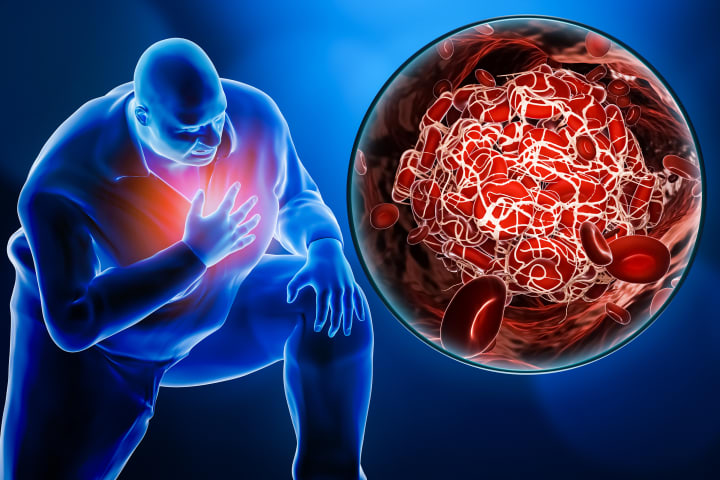
In conditions like atherosclerosis, where fatty plaque builds up in the arteries, platelets can become overzealous. If a plaque ruptures, platelets rush to the site and form a clot, much like they would with a cut or injury. However, in this context, the clot can block the blood flow in the artery, leading to a heart attack or stroke.

Furthermore, certain conditions can make platelets 'hyperactive,' leading to the formation of unnecessary clots, a condition known as thrombosis. These clots can travel through the blood vessels and cause blockages, leading to potentially fatal events.

Striking a Balance: The Role of Antiplatelet Therapy
Given their dual roles, managing platelet activity is a balancing act. In conditions where there's a risk of harmful clot formation, antiplatelet drugs like aspirin can be lifesavers. They work by reducing platelet aggregation, thereby preventing clot formation.
However, it's crucial to note that these medications should only be taken under medical advice, as they can increase the risk of bleeding. The decision to start antiplatelet therapy should be individualised, considering the balance between potential benefits and risks.
Statins: Cholesterol's Nemes
Statins, also known as HMG-CoA reductase inhibitors, are a class of drugs that work by slowing down the production of cholesterol in the body, lowering the total amount of cholesterol in your blood. In this way statins reduce the raw material available for the formation of atherosclerotic plaques.
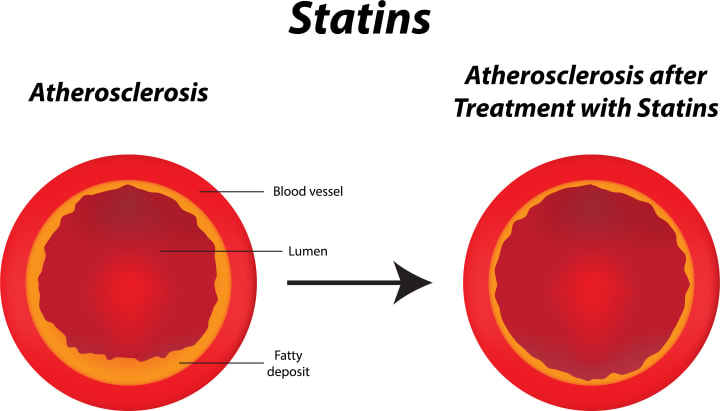
Beyond cholesterol control, statins also exhibit other 'pleiotropic' effects. They help stabilize existing atherosclerotic plaques, reducing the chance of rupture, and have anti-inflammatory properties.
Furthermore, certain conditions can make platelets 'hyperactive,' leading to the formation of unnecessary clots, a condition known as thrombosis. These clots can travel through the blood vessels and cause blockages, leading to potentially fatal events.
Cholesterol: A Balancing Act of Good and Bad
It's a word we typically associate with heart disease, high-fat foods, and statins. But did you know cholesterol is also a vital component of our bodies, playing numerous essential roles?
This waxy, fat-like substance, produced by our liver and obtained from certain foods, is a classic example of a molecule with a dual personality. It's both a hero and a villain, depending on its type and levels in our bodies. Let's delve deeper into this intriguing world of cholesterol.
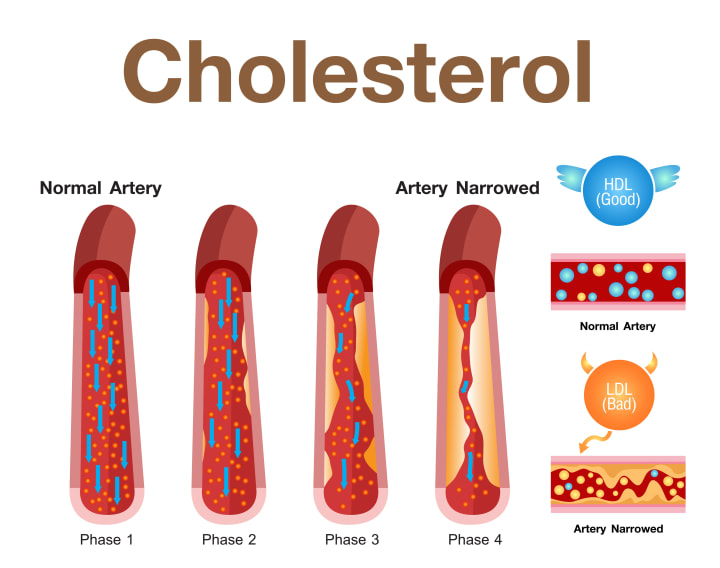
Cholesterol: The Unsung Hero
Cholesterol is an essential molecule playing numerous crucial roles in our bodies. Here's how cholesterol steps into the role of a hero:
Cell Membrane Integrity: Cholesterol is a key component of our cell membranes, providing them with stability and fluidity. This is essential for maintaining the structure and function of our cells.

Hormone Production: Cholesterol is involved in the production of steroid hormones in our bodies, such as cortisol, testosterone, and estrogens, which regulate a host of vital functions.
Vitamin D Synthesis: When sunlight hits our skin, the body converts cholesterol into Vitamin D, a nutrient crucial for bone health and immune function.

Digestion: Cholesterol is a component of bile acids, which are produced by the liver and play a vital role in the digestion and absorption of dietary fats.
Clearly, cholesterol is an unsung hero, quietly contributing to our bodies' proper functioning. But, what happens when the balance tilts?
Cholesterol: The Potential Villain
The villainous side of cholesterol emerges when its levels in the blood get too high, particularly the "bad" kind, known as low-density lipoprotein (LDL) cholesterol. High levels of LDL cholesterol can lead to the formation of plaques, a thick, hard deposit that can clog arteries and make them less flexible, a condition known as atherosclerosis.
If a clot forms and blocks a narrowed artery, it can cause a heart attack or stroke. Therefore, high levels of LDL cholesterol are associated with an increased risk of cardiovascular diseases.
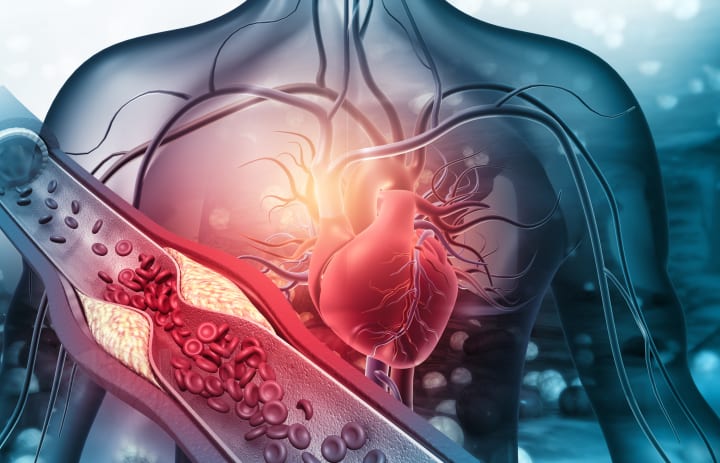
There's also another type of cholesterol: high-density lipoprotein (HDL), often referred to as "good" cholesterol. HDL cholesterol helps return LDL cholesterol to your liver, where it's removed from your body, preventing plaque buildup.
The Balancing Act
Managing cholesterol is all about balance. It's essential to have enough to perform its crucial roles but equally important to prevent its levels from getting too high. Maintaining a healthy diet, regular exercise, and in some cases, taking cholesterol-lowering medicines can help keep your cholesterol levels in check.
Not all Roses: Challenges and Counterarguments
As aspirin celebrates over a century of use in the medical field, it holds a firm place in our medicine cabinets and hearts (quite literally!). But like any medication, it has its share of benefits and potential side effects.
Aspirin, also known as acetylsalicylic acid, is a common over-the-counter medication with anti-inflammatory, analgesic (pain-relieving), antipyretic (fever-reducing), and, importantly, antiplatelet properties. Let's dive in to understand the beneficial effects and potential side effects of this well-known drug.
Beneficial Effects of Aspirin
Pain Relief: Aspirin is effective in relieving mild to moderate pain, such as headaches, toothaches, and muscle aches.
Reduction of Fever: Aspirin can help reduce fever in adults.
Anti-Inflammatory: It's used in the treatment of inflammatory conditions like rheumatic fever and rheumatoid arthritis.
Heart Disease and Stroke Prevention: Perhaps the most significant benefit of aspirin is its antiplatelet effect. By inhibiting platelet aggregation, aspirin can prevent blood clots from forming in the arteries, helping prevent heart attacks and strokes. It's often prescribed to individuals who have had a heart attack or stroke or are at high risk.

Potential Side Effects of Aspirin
Despite its benefits, aspirin isn't without potential side effects. It's important to use aspirin under the guidance of a healthcare professional who can weigh the benefits against the potential risks.
Here are some possible side effects:
Gastrointestinal Issues: Aspirin can cause stomach irritation or discomfort, heartburn, and nausea. More seriously, it can cause ulcers and gastrointestinal bleeding, especially with long-term use or at high doses.
Bleeding Risk: Aspirin's antiplatelet effect can also lead to an increased risk of bleeding. This risk isn't limited to the gastrointestinal tract; it can also increase the risk of bleeding in the brain, leading to a hemorrhagic stroke.
Allergic Reaction: Though rare, some people may be allergic to aspirin. Symptoms can range from mild, like hives and runny nose, to severe, like difficulty breathing.
Reye’s Syndrome: Aspirin should not be used in children or teenagers with fever, especially if the child is recovering from the flu or chickenpox, due to the risk of Reye's syndrome, a rare but serious illness.
Interaction with Other Medications: Aspirin can interact with certain other medications, altering their effects. For example, it can enhance the effect of certain blood thinners, increasing the risk of bleeding.
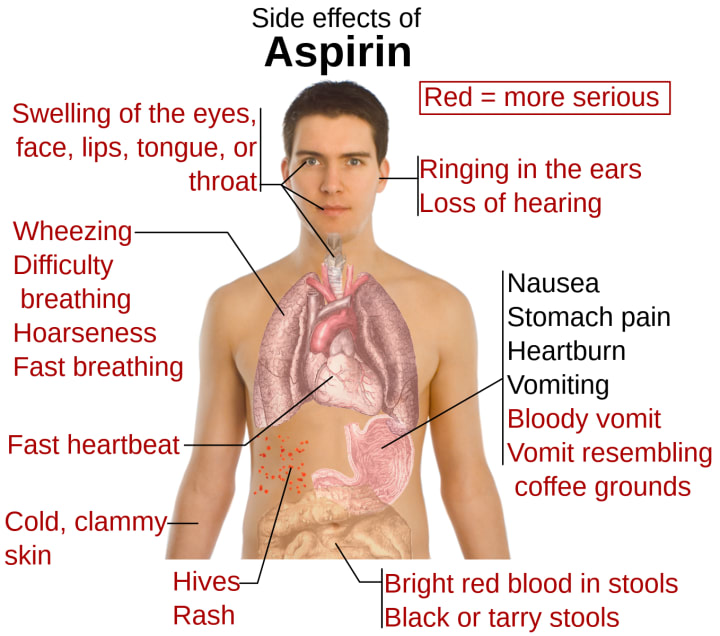
Statins are a class of drugs often prescribed to help lower cholesterol levels in the blood. While they have significant benefits, particularly in preventing cardiovascular diseases, they also have potential side effects that are important to understand.
Statins work by inhibiting a liver enzyme called HMG-CoA reductase, which plays a crucial role in the production of cholesterol. This cuts down the amount of cholesterol circulating in your blood, reducing the risk of atherosclerosis and heart disease. Let's explore the beneficial effects and potential side effects of statins.
Beneficial Effects of Statins
Cholesterol Lowering: Statins are effective in reducing levels of low-density lipoprotein (LDL) cholesterol, often referred to as 'bad cholesterol,' which can lead to the formation of plaques in the arteries.
Stabilizing Plaques: Statins help stabilize existing atherosclerotic plaques, reducing the chance of rupture, which can lead to a heart attack or stroke.
Anti-inflammatory Effects: Statins have anti-inflammatory properties, which can help in reducing inflammation in the arteries.
Reducing Risk of Cardiovascular Diseases: By lowering cholesterol levels, stabilizing plaques, and exerting anti-inflammatory effects, statins significantly reduce the risk of cardiovascular diseases, including heart attacks and strokes.

Potential Side Effects of Statins
Like all medications, statins can have side effects. Not everyone who takes a statin will have side effects, but some people may be at a higher risk than others.
Here are some potential side effects:
Muscle Pain and Damage: One of the most common complaints of people taking statins is muscle pain, which can range from a mild discomfort to significant pain. In rare cases, statins can cause more severe muscle damage called rhabdomyolysis.
Liver Damage: Statins can cause an increase in your liver enzymes, which could indicate liver damage. However, serious liver injury is rare.
Increased Blood Sugar: Statins can increase your blood sugar levels, which can lead to type 2 diabetes in some individuals.
Neurological side effects: Some people have reported memory loss and confusion while taking statins. However, these reports have been anecdotal, and large studies have not found a strong link between statin use and these symptoms.
The Takeaway
As we've seen, Aspirin and Statins play crucial roles in the management of atherosclerosis. They're not a magic bullet, but when used appropriately, they can significantly reduce the risk of life-threatening cardiovascular events.
However, it's important to remember that these medications should be part of a broader strategy to fight atherosclerosis, including a healthy diet, regular exercise, and smoking cessation.
So, next time you think about heart health, remember the silent role of atherosclerosis, and the mighty warriors fighting it – Aspirin and Statins.
About the Creator
Mohammad Barbati
Mohammad E. Barbati, MD, FEBVS, is a consultant vascular and endovascular surgeon at University Hospital RWTH Aachen. To date, he has authored several scientific publications and books regarding vascular and venous diseases.


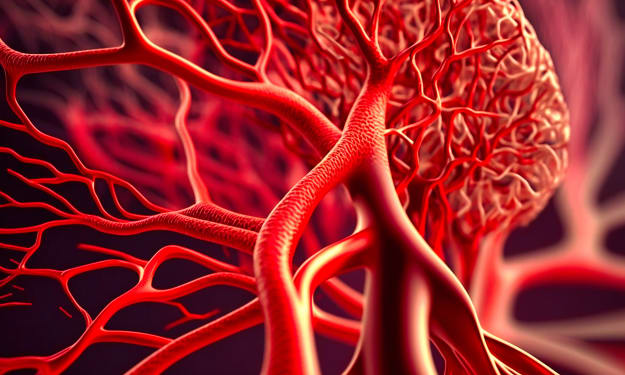



Comments
There are no comments for this story
Be the first to respond and start the conversation.